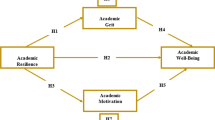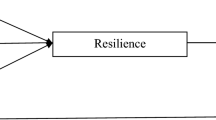Abstract
Gratitude, like other positive emotions, has been theorized to help individuals build psychological and social resources and promote resilience and well-being. Some scholars suggest that gratitude may not generate positive outcomes in all cultures. In this study, we examined the relationship of gratitude with school resilience and school well-being, and the potential mediating role of relatedness with key social partners within an Asian cultural context. Participants in the study were 190 secondary students attending one school in Singapore. Results revealed that gratitude was positively associated with school resilience; relatedness with significant others partially mediated this association. The final model also showed a significant sequential pathway from gratitude to relatedness (with significant others), then to school resilience and then to school well-being. Practical implications and limitations of this study are presented.



Similar content being viewed by others
Explore related subjects
Discover the latest articles and news from researchers in related subjects, suggested using machine learning.References
Algoe, S. B., Haidt, J., & Gable, S. L. (2008). Beyond reciprocity: Gratitude and relationships in everyday life. Emotion, 8(3), 425.
Algoe, S. B., & Stanton, A. L. (2012). Gratitude when it is needed most: Social functions of gratitude in women with metastatic breast cancer. Emotion, 12(1), 163–168.
Anderson, R. E. (2018). And still we rise: Parent–child relationships, resilience, and school readiness in low-income urban black families. Journal of Family Psychology, 32(1), 60–70.
Bono, G., Froh, J. J., & Emmons, R. A. (2012). Searching for the developmental role of gratitude: A 4-year longitudinal analysis. Paper presented at the annual meeting of the American Psychological Association, Orlando, FL.
Caleon, I. S., & King, R.B. (forthcoming). Development and validation of the School Resilience Scale.
Caleon, I. S., King, R. B., Tan, J. P.-L., Low, M., Tan, C. S., & Liem, G. A. D. (2017). Nurturing grateful and connected twenty-first century learners: Development and evaluation of a socially-oriented gratitude intervention. Asia Pacific Journal of Education, 37(4), 567–581.
Chan, D. W. (2013). Counting blessings versus misfortunes: Positive interventions and subjective well-being of Chinese school teachers in Hong Kong. Educational Psychology, 33(4), 504–519.
Caputi, M., Lecce, S., Pagnin, A., & Banerjee, R. (2012). Longitudinal effects of theory of mind on later peer relations: the role of prosocial behavior. Developmental Psychology, 48(1), 257–270.
Chu, P. S., Saucier, D. A., & Hafner, E. (2010). Meta-analysis of the relationships between social support and well-being in children and adolescents. Journal of Social and Clinical Psychology, 29(6), 624–645.
Clark, L. A., & Watson, D. (1988). Mood and the mundane: Relations between daily life events and self-reported mood. Journal of Personality and Social Psychology, 54(2), 296–308.
Cohn, M. A., Fredrickson, B. L., Brown, S. L., Mikels, J. A., & Conway, A. M. (2009). Happiness unpacked: Positive emotions increase life satisfaction by building resilience. Emotion, 9(3), 361–368.
Datu, J. A. D. (2014). Forgiveness, gratitude and subjective well-being among Filipino adolescents. International Journal for the Advancement of Counselling, 36(3), 262–273.
Datu, J. A. D., & Mateo, N. J. (2015). Gratitude and life satisfaction among Filipino adolescents: The mediating role of meaning in life. International Journal for the Advancement of Counselling, 37(2), 198–206.
Diener, E. (1984). Subjective well-being. Psychological Bulletin, 95, 542–575.
Emmons, R. A., & McCullough, M. E. (2003). Counting blessings versus burdens: An experimental investigation of gratitude and subjective well-being in daily life. Journal of Personality and Social Psychology, 84(2), 377–389.
Fang, L., & Schinke, S. P. (2013). Two-year outcomes of a randomized, family-based substance use prevention trial for Asian American adolescent girls. Psychology of Addictive Behaviors, 27(3), 788–798.
Fredrickson, B. L. (1998). What good are positive emotions? Review of General Psychology, 2(3), 300–319.
Fredrickson, B. L. (2004). Gratitude, like other positive emotions, broadens and builds. In R. A. Emmons & M. E. McCullough (Eds.), Series in affective science. The psychology of gratitude (pp. 145–166). New York: Oxford University Press.
Fredrickson, B. L., & Branigan, C. (2005). Positive emotions broaden the scope of attention and thought-action repertoires. Cognition and Emotion, 19(3), 313–332.
Fritz, M. S., & MacKinnon, D. P. (2007). Required sample size to detect the mediated effect. Psychological Science, 18(3), 233–239.
Froh, J. J., Sefick, W. J., & Emmons, R. A. (2008). Counting blessings in early adolescents: An experimental study of gratitude and subjective well-being. Journal of School Psychology, 46, 213–233.
Furrer, C., & Skinner, E. (2003). Sense of relatedness as a factor in children’s academic engagement and performance. Journal of Educational Psychology, 95(1), 148–162.
Gilman, R., Huebner, E. S., & Laughlin, J. E. (2000). A first study of the Multidimensional Students’ Life Satisfaction Scale with adolescents. Social Indicators Research, 52(2), 135–160.
Grant, A. M., & Gino, F. (2010). A little thanks goes a long way: Explaining why gratitude expressions motivate prosocial behavior. Journal of Personality and Social Psychology, 98(6), 946–955.
Healy, K. L., & Sanders, M. R. (2014). Randomized controlled trial of a family intervention for children bullied by peers. Behavior Therapy, 45(6), 760–777. https://doi.org/10.1016/j.beth.2014.06.001.
Isen, A. M., & Daubman, K. A. (1984). The influence of affect on categorization. Journal of Personality and Social Psychology, 47(6), 1206–1217.
Kashdan, T. B., Uswatte, G., & Julian, T. (2006). Gratitude and hedonic and eudaimonic well-being in Vietnam war veterans. Behaviour Research and Therapy, 44(2), 177–199.
King, R. B., & Datu, J. A. D. (2018). Grateful students are motivated, engaged, and successful in school: Cross-sectional, longitudinal, and experimental evidence. Journal of School Psychology, 70, 105–122.
Kong, F., Ding, K., & Zhao, J. (2015). The relationships among gratitude, self-esteem, social support and life satisfaction among undergraduate students. Journal of Happiness Studies, 16(2), 477–489.
Kraus, R., Desmond, S. A., & Palmer, Z. D. (2015). Being thankful: Examining the relationship between young adult religiosity and gratitude. Journal of Religion and Health, 54(4), 1331–1344.
Layous, K., Lee, H., Choi, I., & Lyubomirsky, S. (2013). Culture matters when designing a successful happiness-increasing activity: A comparison of the United States and South Korea. Journal of Cross-Cultural Psychology, 44(8), 1294–1303.
Lee, W. O. (2004). Emerging concepts of citizenship in the Asian context. In W. O. Lee, D. L. Grossman, K. J. Kennedy, & G. P. Fairbrother (Eds.), Citizenship education in Asia and the Pacific: Concepts and issues. Hong Kong: Kluwer.
Lyubomirsky, L., Sheldon, K. M., & Schkade, D. (2005). Pursuing happiness: The architecture of sustainable change. Review of General Psychology, 9(2), 111–131.
Ma, M., Kibler, J. L., & Sly, K. (2013). Gratitude is associated with greater levels of protective factors and lower levels of risks in African American adolescents. Journal of Adolescence, 36(5), 983–991.
MacKinnon, D. P., Lockwood, C. M., & Williams, J. (2004). Confidence limits for the indirect effect: Distribution of the product and resampling methods. Multivariate Behavioral Research, 39, 99–128.
Masten, A., Best, K. M., & Garmezy, N. (1990). Resilience and development: Contributions from the study of children who overcome adversity. Development and Psychopathology, 2(04), 425–444. https://doi.org/10.1017/S0954579400005812.
Masten, A. S., Herbers, J. E., Cutuli, J. J., & Lafavor, T. L. (2008). Promoting competence and resilience in the school context. Professional School Counseling, 12(2), 76–84.
McCullough, M. E., Emmons, R. A., & Tsang, J. (2002). The grateful disposition: A conceptual and empirical topography. Journal of Personality and Social Psychology, 82(1), 112–127.
McCullough, M. E., Kilpatrick, S. D., Emmons, R. A., & Larson, D. B. (2001). Is gratitude a moral affect? Psychological Bulletin, 127(2), 249–266.
McCullough, M. E., Tsang, J. A., & Emmons, R. A. (2004). Gratitude in intermediate affective terrain: Links of grateful moods to individual differences and daily emotional experience. Journal of Personality and Social Psychology, 86, 295–309.
Nunnaly, J. (1978). Psychometric theory. New York: McGraw-Hill.
O’Connell, B. H., O’Shea, D., & Gallagher, S. (2015). Enhancing social relationships through positive psychology activities: A randomised controlled trial. The Journal of Positive Psychology, 11(2), 149–162.
Otsuka, Y., Hori, M., & Kawahito, J. (2012). Improving well-being with a gratitude exercise in Japanese workers: A randomized controlled trial. International Journal of Psychology and Counselling, 4(7), 86–91.
Pieters, R. (2017). Meaningful mediation analysis: Plausible causal inference and informative communication. Journal of Consumer Research, 44(3), 692–716.
Preacher, K. J., & Hayes, A. F. (2008). Asymptotic and resampling strategies for assessing and comparing indirect effects in multiple mediator models. Behavior Research Methods, 40, 879–891.
Reis, H. T., & Shaver, P. (1988). Intimacy as an interpersonal process. Handbook of Personal Relationships, 24(3), 367–389.
Ryan, R. M., & Deci, E. L. (2001). On happiness and human potentials: A review of research on hedonic and eudaimonic well-being. Annual Review of Psychology, 52(1), 141–166.
Ryff, C. D. (2014). Psychological well-being revisited: Advances in the science and practice of eudaimonia. Psychotherapy and Psychosomatics, 83(1), 10–28. https://doi.org/10.1159/000353263.
Ryff, C. D., & Singer, B. (1998). The contours of positive human health. Psychological Inquiry, 9(1), 1–28.
Sanders, J., Munford, R., & Liebenberg, L. (2016). The role of teachers in building resilience of at risk youth. International Journal of Educational Research, 80, 111–123.
Shrout, P. E., & Bolger, N. (2002). Mediation in experimental and nonexperimental studies: New procedures and recommendations. Psychological Methods, 7, 422–445.
Sidhu, R. K. (2006). Universities and globalization: To market, to market. Mahwah, NJ: Lawrence Erlbaum Associates, Publishers.
Sun, P., Jiang, H., Chu, M., & Qian, F. (2014). Gratitude and school well-being among Chinese university students: Interpersonal relationships and social support as mediators. Social Behavior and Personality: An International Journal, 42(10), 1689–1698.
Tian, L., Du, M., & Huebner, E. (2015). The effect of gratitude on elementary school students’ subjective well-being in schools: The mediating role of prosocial behavior. Social Indicators Research, 122(3), 887–904. https://doi.org/10.1007/s11205-014-0712-9.
Tian, L., Pi, L., Huebner, E. S., & Du, M. (2016). Gratitude and adolescents’ subjective well-being in school: The multiple mediating roles of basic psychological needs satisfaction at school. Frontiers in Psychology, 7(1409), 1–8.
Tugade, M. M., Fredrickson, B. L., & Feldman Barrett, L. (2004). Psychological resilience and positive emotional granularity: Examining the benefits of positive emotions on coping and health. Journal of Personality, 72(6), 1161–1190.
Van Voorhis, C. R., & Morgan, B. L. (2007). Understanding power and rules of thumb for determining sample sizes. Tutorials in Quantitative Methods for Psychology, 3(2), 43–50.
Wadlinger, H. A., & Isaacowitz, D. M. (2006). Positive mood broadens visual attention to positive stimuli. Motivation and Emotion, 30(1), 87–99.
Wilson, J. T. (2016). Brightening the mind: The impact of practicing gratitude on focus and resilience in learning. Journal of the Scholarship of Teaching and Learning, 16(4), 1–13.
Wood, A. M., Froh, J. J., & Geraghty, A. W. (2010). Gratitude and well-being: A review and theoretical integration. Clinical Psychology Review, 30(7), 890–905.
Wood, A. M., Maltby, J., Gillett, R., Linley, P. A., & Joseph, S. (2008). The role of gratitude in the development of social support, stress, and depression: Two longitudinal studies. Journal of Research in Personality, 42(4), 854–871.
Zheng, Y., Fan, Y., & Luo, C. (2011). Relationship between gratitude and symptoms of posttraumatic stress disorder among adolescents: Mediation of social support and resilience. Psychological Development and Education, 27, 522–528.
Acknowledgements
The authors would like to thank the National Institute of Education (NIE), Nanyang Technological University, for offering grant support to Project Grant SUG 11/15 ISC. Part of the findings of this project was presented in this paper. Any opinions, findings and conclusions or recommendations expressed in this paper are those of the authors and do not necessarily reflect the views of NIE.
Author information
Authors and Affiliations
Corresponding author
Additional information
Publisher's Note
Springer Nature remains neutral with regard to jurisdictional claims in published maps and institutional affiliations.
Rights and permissions
About this article
Cite this article
Caleon, I.S., Ilham, N.Q.B., Ong, C.L. et al. Cascading Effects of Gratitude: A Sequential Mediation Analysis of Gratitude, Interpersonal Relationships, School Resilience and School Well-being. Asia-Pacific Edu Res 28, 303–312 (2019). https://doi.org/10.1007/s40299-019-00440-w
Published:
Issue Date:
DOI: https://doi.org/10.1007/s40299-019-00440-w




